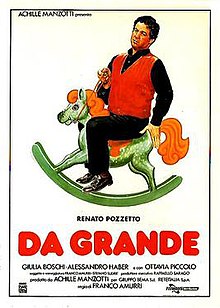Da grande (film)
 From Wikipedia - Reading time: 6 min
From Wikipedia - Reading time: 6 min
| Da grande | |
|---|---|
 Theatrical release poster | |
| Directed by | Franco Amurri |
| Written by | Franco Amurri Stefano Sudriè |
| Produced by | Achille Manzotti |
| Starring | |
| Cinematography | Luciano Tovoli |
| Edited by | Raimondo Crociani |
| Music by | Pino Massara |
Release date |
|
Running time | 94 minutes |
| Country | Italy |
| Language | Italian |
Da grande is a 1987 Italian comedy film directed by Franco Amurri, starring Renato Pozzetto, Ottavia Piccolo and Alessandro Haber.[1][2][3]
Da grande is one of the coming-of-age comedies that were released in the late 1980s.[4][5] It has been claimed to be the inspiration for Big,[6][7] the 1988 international blockbuster directed by Penny Marshall and starring Tom Hanks.
Plot
[edit]Eight-year-old Marco Marinelli is a bedwetter, scolded by his mother (Ottavia Piccolo) and teased by his classmates. On his birthday, he finds out that his father (Alessandro Haber), who is facing economic difficulties, has not brought him the Lego he was promised. He runs in tears to his room and puts all his heart into wishing he were big and not subject to these indignities. As a result, he bursts through his clothes in the guise of a forty-year-old man (Renato Pozzetto) and seeks refuge in the house of his schoolteacher Francesca (Giulia Boschi), who he is secretly in love with. Mentally, he is still eight years old, and it is a puzzle what to do with him, until someone discovers that he has an uncanny rapport with children. He then becomes a full-time and highly requested babysitter, but shortly after he is suspected of abducting the by-now long-missing child Marco. He then runs out of money, and fakes the kidnapping of himself, but while chased by the police he eventually turns back into the eight-year-old boy. He leaves a letter to Francesca who, upon realising the boy and man were one, uses the magic to join him as a little girl.
Cast
[edit]- Renato Pozzetto as grown-up Marco
- Ioska Versari as normal Marco
- Giulia Boschi as Francesca (Marco's teacher)
- Alessandro Haber as Claudio (Marco's father)
- Ottavia Piccolo as Anna (Marco's mother)
- Alessandro Partexano as the police detective
- Giampiero Bianchi as Nicola (Marco's uncle)
- Gaia Piras as Silvietta (Marco's sister)
- Ilary Blasi as the girl playing hide-and-seek
Reception
[edit]Da grande won the Nastro d'Argento (Silver Ribbon) for Best Story, the oldest movie award in Europe, assigned since 1946 by Sindacato Nazionale dei Giornalisti Cinematografici Italiani (the association of Italian film critics).[8][9]
References
[edit]- ^ "Da grande (1987)". Retrieved September 21, 2011.
- ^ "Franco Amurri". Hollywood.com. Retrieved September 21, 2011.
- ^ "Da grande". Artistdirect. Retrieved September 21, 2011.
- ^ Harmetz, Aljean (January 15, 1990). "The Media Business; Buchwald Ruling: Film Writers vs. Star Power". The New York Times. Retrieved September 20, 2011.
- ^ "Da grande - Un classico della fantasia di un bambino: diventare adulto". Corriere della Sera. Archived from the original on March 26, 2012. Retrieved September 21, 2011.
- ^ "Cinema Italiano 2010: Master of Ceremonies and Jurors". Cinema Italiano in Hawaii. Retrieved September 15, 2011.
- ^ Irazábal Martín, Concha (1996). Alice, Sí Está: Directoras de Cine Europeas y Norteamericanas 1896-1996. Vol. 23 of Cuadernos inacabados. Horas y Horas. ISBN 9788487715594.
- ^ "Awards for Da grande". Internet Movie Database. Retrieved September 14, 2011.
- ^ "Italian National Syndicate of Film Journalists, Awards for 1988". Internet Movie Database. Retrieved September 15, 2011.
 KSF
KSF